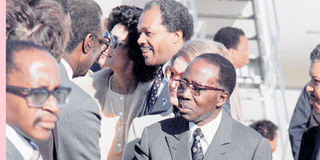The failed vision of a united Africa - Part X

President Léopold Sedar Senghor of Senegal, middle, and members of his party are welcomed upon their arrival in the United States for a visit in 1980. photo | file
What you need to know:
- Senghor took many positions of leadership in society including being mayor of the city of Thiès in November, 1956; advisory minister in the colonial government of Michel Debré for 3 years from July 23, 1956 to May 19, 1959. He also took other positions of importance like; general councillor for Senegal and Member for the Parliamentary Assembly of the European Council.
The vision of united Africa and pan-Africanism is founded on stories of the first generation of leaders including Léopold Sédar Senghor of Senegal. This week we continue to look at the life story of this great pan-African leader who wanted a united Africa.
Senghor took many positions of leadership in society including being mayor of the city of Thiès in November, 1956; advisory minister in the colonial government of Michel Debré for 3 years from July 23, 1956 to May 19, 1959. He also took other positions of importance like; general councillor for Senegal and Member for the Parliamentary Assembly of the European Council.
In 1957, as the advisory minster in the Senegalese colonial government, he gave a speech that showed his vision of a free and united independent federal States of Africa within the French ambience.
He said: “In Africa, when children have grown up, they leave their parents’ hut, and build a hut of their own by its side. Believe me, we don’t want to leave the French compound. We have grown up in it and it is good to be alive in it. We simply want to build our own huts”.
Although his federalism idea was not favoured by most of the western African colonial countries, Senghor convinced Modibo Keita of French Sudan which later became Sudanese Republic (present day Mali) to unite with Senegal to become the Mali Federation on April 4, 1959. Then the Mali Federation gained independence from France on June 20, 1960. Later in August 1960, Senegal withdrew from the federation of which allowed the Sudanese Republic to gain its independence and became the Republic of Mali on September 22, 1960 and Modibo Keïta became the first president of the Republic of Mali.
After withdrawing from the Federation on September 5, 1960, Senghor was elected the first President of the Republic of Senegal and Mamadou Dia became Prime Minister. His pan-Africanist vision began to show up again when his regime supported federalism for newly independent African states, while retaining a degree of French involvement. Most of his colleagues in government did not agree with him and the resolved to eliminate him.
Due to this disagreements in December 1962, Senghor forced Mamadou Dia to resign from his position as Prime Minister and later imprisoned him for 12 years, alleged of inciting a coup d’état to overthrow the president. Following this, Senghor turned himself into an Executive President and later established a multi-party system in Senegal consists of the socialists, communists; and liberals.
He ruled for five terms of five years each in his established multiparty democracy where he won the presidency each time. After surviving one coup d’état in 1962 and an assassination attempt on the March 22, 1967, Senghor voluntarily stepped aside from national leadership on December 31, 1980.
After his retirement he supported the creation of la Francophonie Organisation and was elected vice-president of the High Council of the la Francophonie. In 1982, he was one of the founders of the Association France and developing countries whose objectives were to look at the problems of developing countries that were playing out at this time and propose possible solutions.
He later moved to France and spent the last years of his life in the Verson community near the city of Caén in Normandy, northwestern France. The founding father of independent Senegal, Léopold Sédar Senghor, died on December 20, 2001, at the age of 95 and was buried on December 29, 2001 in Dakar Senegal.
Dr Kafumu is the Member of Parliament for Igunga Constituency



